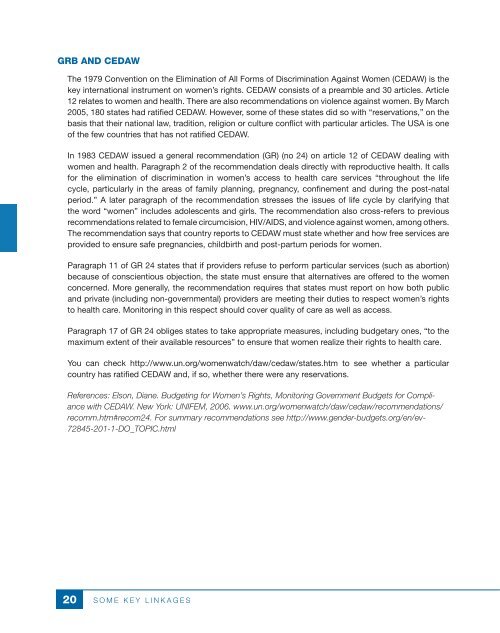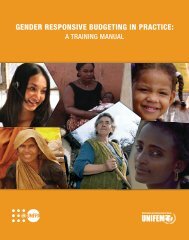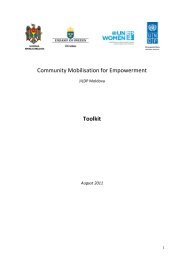Gender Responsive Budgeting and Women's Reproductive Rights ...
Gender Responsive Budgeting and Women's Reproductive Rights ...
Gender Responsive Budgeting and Women's Reproductive Rights ...
Create successful ePaper yourself
Turn your PDF publications into a flip-book with our unique Google optimized e-Paper software.
GRB <strong>and</strong> CEDAWThe 1979 Convention on the Elimination of All Forms of Discrimination Against Women (CEDAW) is thekey international instrument on women’s rights. CEDAW consists of a preamble <strong>and</strong> 30 articles. Article12 relates to women <strong>and</strong> health. There are also recommendations on violence against women. By March2005, 180 states had ratified CEDAW. However, some of these states did so with “reservations,” on thebasis that their national law, tradition, religion or culture conflict with particular articles. The USA is oneof the few countries that has not ratified CEDAW.In 1983 CEDAW issued a general recommendation (GR) (no 24) on article 12 of CEDAW dealing withwomen <strong>and</strong> health. Paragraph 2 of the recommendation deals directly with reproductive health. It callsfor the elimination of discrimination in women’s access to health care services “throughout the lifecycle, particularly in the areas of family planning, pregnancy, confinement <strong>and</strong> during the post-natalperiod.” A later paragraph of the recommendation stresses the issues of life cycle by clarifying thatthe word “women” includes adolescents <strong>and</strong> girls. The recommendation also cross-refers to previousrecommendations related to female circumcision, HIV/AIDS, <strong>and</strong> violence against women, among others.The recommendation says that country reports to CEDAW must state whether <strong>and</strong> how free services areprovided to ensure safe pregnancies, childbirth <strong>and</strong> post-partum periods for women.Paragraph 11 of GR 24 states that if providers refuse to perform particular services (such as abortion)because of conscientious objection, the state must ensure that alternatives are offered to the womenconcerned. More generally, the recommendation requires that states must report on how both public<strong>and</strong> private (including non-governmental) providers are meeting their duties to respect women’s rightsto health care. Monitoring in this respect should cover quality of care as well as access.Paragraph 17 of GR 24 obliges states to take appropriate measures, including budgetary ones, “to themaximum extent of their available resources” to ensure that women realize their rights to health care.You can check http://www.un.org/womenwatch/daw/cedaw/states.htm to see whether a particularcountry has ratified CEDAW <strong>and</strong>, if so, whether there were any reservations.References: Elson, Diane. <strong>Budgeting</strong> for Women’s <strong>Rights</strong>, Monitoring Government Budgets for Compliancewith CEDAW. New York: UNIFEM, 2006. www.un.org/womenwatch/daw/cedaw/recommendations/recomm.htm#recom24. For summary recommendations see http://www.gender-budgets.org/en/ev-72845-201-1-DO_TOPIC.html20S O M E K E Y L I N K A G E S





